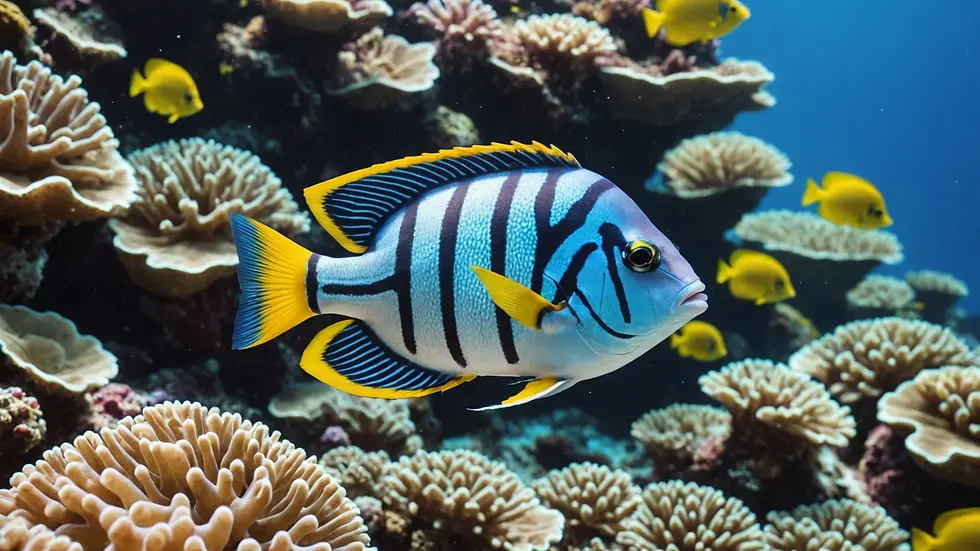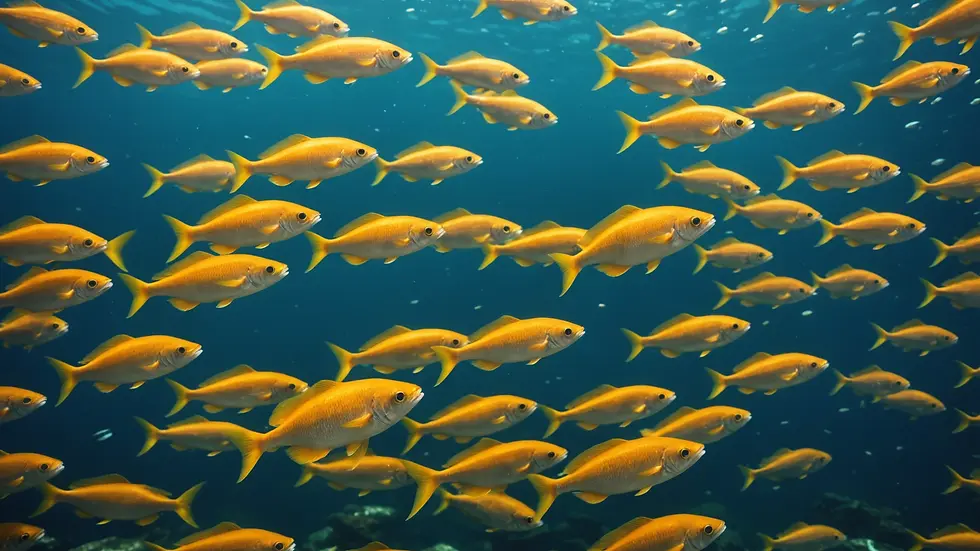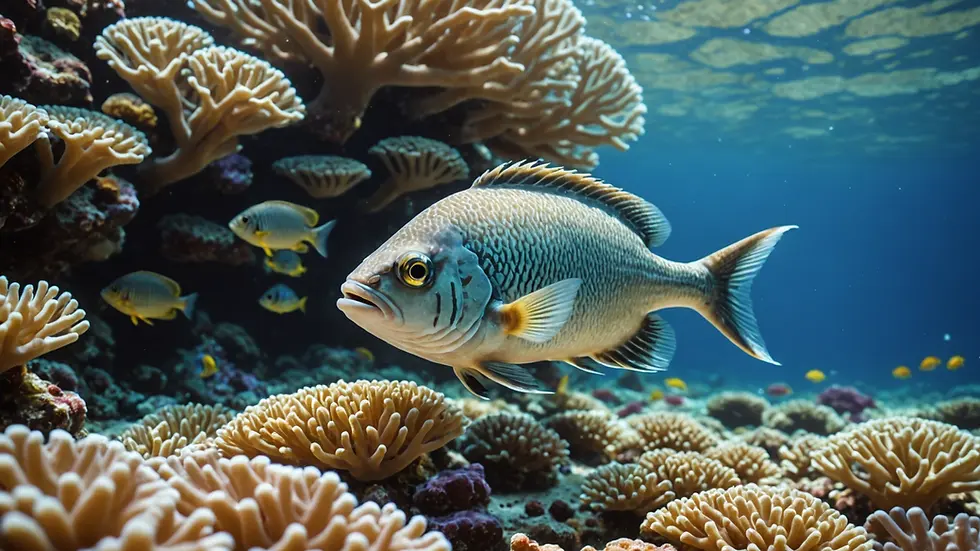How Do Fish Remember? Unraveling the Mystery of Fish Intelligence
- Jyotiraj Borah
- Feb 5
- 4 min read
Fish have often been viewed as unthinking creatures, driven by instinct. However, research reveals that they possess remarkable cognitive abilities, particularly in memory. This raises an intriguing question: how do fish remember, and what does this tell us about their intelligence?
In this article, we will dive into the captivating realm of fish memory. We will look at the research shedding light on their cognitive skills, how they adapt to their environments, and the implications for their survival in the wild.
Understanding Fish Memory
Memory can be defined as the ability to acquire, store, and recall information. Scientists once assumed that fish memory was purely instinctual. However, emerging evidence shows that fish not only remember but use their memory in advanced ways. This helps them navigate their surroundings and interact with each other.
Memory capabilities vary by species, habitat, and experiences. For example, parrotfish, which have complex social structures, demonstrate higher memory skills essential for social interactions. Studies have shown that many fish can recall past experiences and connect them with environmental cues. This associative memory is critical for survival, enabling fish to evade predators, find food, and explore complex environments.
Types of Memory in Fish
Fish exhibit different types of memory, each playing a vital role in their lives.
Short-Term Memory
Short-term memory helps fish recall recent events or stimuli. Studies indicate that fish can remember important information for several minutes to an hour. For example, when they detect alarm signals from their environment, they can remember these cues and react quickly when faced with future threats. This ability is crucial in predator-prey scenarios, where quick memory leads to survival.
Long-Term Memory
Long-term memory allows fish to retain information over a longer time frame, sometimes for years. Species that migrate, like salmon, rely on long-term memory to navigate established routes. These fish remember specific landmarks and environmental features based on prior journeys, which is vital for their life cycle and mating success.
Spatial Memory
Spatial memory is critical for fish as they navigate their environments, especially in complex habitats like coral reefs. Studies have shown that species like the Nassau grouper can remember significant locations, such as food sources and safe spawning sites. Their ability to remember specific landmarks helps them maintain their territories and locate necessary resources.
Experiments on Fish Intelligence
Researchers have conducted various experiments to evaluate fish memory and intelligence. One effective method involves maze navigation, where fish must maneuver through obstacles to reach a food reward.
The Maze Experiment
In maze experiments, researchers observed fish learning to navigate intricate paths to access food. For instance, goldfish managed to remember the correct route after multiple trials, demonstrating their ability to adjust behaviors based on previous experiences. About 70% of the fish navigated the maze successfully after a series of tests, illustrating their learning capabilities. This research not only showcases fish learning potential but also raises questions about their problem-solving skills, particularly compared to other animals.
Social Learning
Social learning is another key area that highlights fish intelligence. In studies focused on predator recognition, researchers found that fish could learn from watching the behavior of peers. By observing a fellow fish reacting to danger, they were able to adjust their own responses accordingly. This type of learning suggests that fish possess a more complex social life than previously believed, which points to a higher level of cognition.
Factors Influencing Fish Memory
Several factors affect fish memory. Understanding these influences sheds light on their cognitive abilities.
Environmental Complexity
The complexity of a fish's environment significantly impacts memory development. Fish living in intricate habitats, such as coral reefs, often demonstrate better memory retention. For example, one study found that fish in complex structures had memory retention rates about 30% higher than those in simpler environments. Navigating these rich environments requires advanced memory skills for locating hiding spots and food sources.
Age and Experience
Age affects memory capabilities in fish. Younger fish often learn faster as they are exploratory by nature. Conversely, older fish can leverage their accumulated experiences, which aids long-term memory retention of vital survival skills. Research shows that aged fish may remember crucial locations and food sources with up to a 50% better recall rate compared to younger ones.
Social Interactions
Social interactions are essential for enhancing memory and intelligence in fish. Species that live in schools or groups develop intricate communication patterns and behaviors that demand memory retention. This communal living means fish can improve their survival strategies through shared experiences, further enriching their memory.
Fish Intelligence and Human Interaction
Understanding fish memory and intelligence has significant implications for human interactions with them, particularly in aquaculture and fishing practices.
Aquaculture
Recognizing that fish have cognitive abilities can shape aquaculture practices. Creating stimulating environments can encourage healthy memory development and better overall well-being in farmed fish. For example, adding structures like plants and rocks in fish farms can improve their growth rates and health by up to 25%.
Sustainable Fishing Practices
For both recreational and commercial fishing, understanding fish memory can lead to more sustainable practices. Since many fish remember locations linked to danger or plentiful resources, this knowledge can alter how fishermen select spots, thus protecting vulnerable populations. Implementing catch-and-release strategies based on enhanced understanding of fish behavior can significantly contribute to sustainability.
Education and Awareness
There is an urgent need to raise awareness about fish intelligence. Promoting knowledge about their cognitive abilities can lead to greater respect for these animals. Emphasizing the importance of preserving their ecosystems and habitats fosters a commitment to aquatic life conservation.
Final Thoughts
The understanding of fish intelligence and memory is growing, challenging our old views on these incredible creatures. Research shows that fish can exhibit various types of memory, such as short-term, long-term, and spatial memory, allowing them to adeptly navigate their environments and interact with others.
As we broaden our knowledge of fish cognition, we enhance our care and conservation efforts. By exploring the mystery of fish memory, we not only gain insights into their world but also cultivate greater appreciation for their role within our ecosystems.







Comments